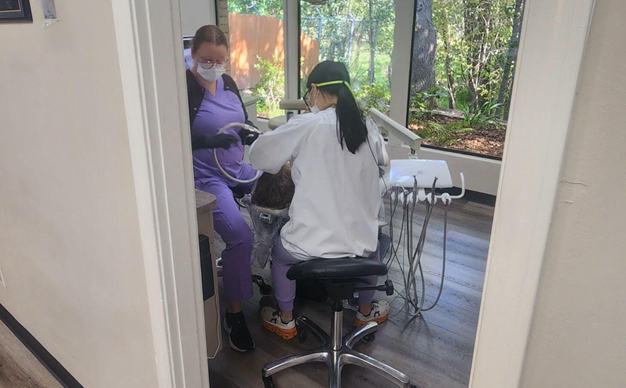
IMPORTANT INFORMATION ABOUT TOOTH EXTRACTION
At Discover Dental, the well-being and care of our patients are our utmost priority. Our team consists of highly skilled professionals committed to ensuring a comfortable and stress-free dental experience. We strive to offer compassionate, personalized attention, providing precise and gentle care that has earned the trust and respect of our patients.
While our primary goal is to preserve the integrity of your natural smile, there are instances when tooth extraction becomes necessary to prioritize your oral health and overall well-being.
Our office may recommend tooth extraction for several common reasons.
An over-retained deciduous tooth, commonly referred to as a "baby" tooth, may undergo severe decay or damage. Typically, a baby tooth naturally falls out as the permanent tooth emerges. However, there are instances where the baby tooth remains firmly attached to the bone, either because its roots do not shrink as expected or due to fusion with the supporting bone. Prolonged retention of baby teeth can impact your child's smile development and alignment. As we monitor your child's growth, we will advise you if the removal of a baby tooth is necessary to facilitate the proper eruption of the permanent tooth.
Severe decay in a tooth that cannot be restored can cause substantial damage to its structure, potentially leading to nerve damage, dental infections, and other oral health issues. Neglecting a cavity can have significant consequences for your overall well-being. In cases of extensive structural damage where saving the tooth is not feasible, dental extraction may be required.
Teeth experiencing severe fractures or cracks beyond repair might necessitate extraction. Various forms of chips, cracks, and fractures can affect teeth, and the severity of the damage determines whether the tooth can be salvaged or requires extraction.
Wisdom teeth, or third molars, may cause issues if improperly positioned, impacted by adjacent teeth, or affected by decay. While wisdom tooth extraction is often suggested for older individuals, early removal of problematic or potentially troublesome third molars is commonly recommended for young adults.
When teeth are disproportionately sized for the jaw, overcrowding can occur, leading to an improperly aligned smile. As part of an orthodontic treatment plan to achieve a well-aligned, attractive, healthy, and functional bite, the extraction of specific permanent teeth may be necessary.
What is the process for performing a tooth extraction?
Our dental practice is committed to providing exceptional care for dental extractions, regardless of the underlying reasons. Our dentist will thoroughly review your medical and dental histories and discuss any specific considerations for your treatment.
It is crucial to disclose any existing medical conditions or medications you are currently taking. In certain instances, additional precautions such as antibiotics or adjustments to medication might be necessary. Medical clearance may also be required. Please follow all pre-surgical instructions and inform us if you feel unwell or experience any symptoms on the day of your surgery.
Our primary objective is to alleviate anxiety and ensure your comfort throughout the tooth extraction process. Before the procedure, we will address any medical concerns or precautions and provide detailed pre-surgical instructions. Post-surgical recommendations, including options for replacing the extracted tooth or teeth and ongoing care, will also be discussed.
To accurately assess the tooth and determine the suitable extraction method, a comprehensive examination and digital radiographs, if necessary, will be conducted. Extractions are typically categorized as either "simple" or "surgical extractions."
